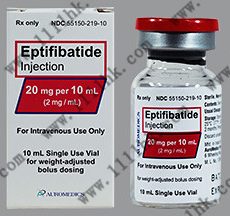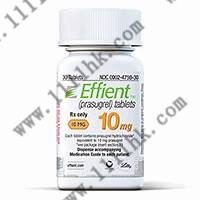Coronary artery dilatation , Coronary artery occlusion
Epeptide
【Product name】Eptifibatide
[English common name]Integrilin
[Chinese common name] Epeptide
[English name]
[Chinese other name]
[indications]For acuteCoronary syndromePatient treatment (notStable angina/Non-ST-segment elevation myocardial infarction):
1. Patients who will receive medical treatment and patients undergoing percutaneous coronary intervention (PCI).
2. Patients undergoing PCI, including those undergoing coronary stenting.
【Dosage】The safety and efficacy of eptifibatide has been established in clinical studies in combination with heparin and aspirin. Different dosing regimens have been used for eptifibatide in clinical studies.
Acute coronary syndrome
(1) For patients with acute coronary syndrome and normal renal function, the recommended adult dose for this product is: 180 μg/kg intravenous bolus as soon as possible after diagnosis, followed by continuous vein at 2.0 μg/kg/min Instillation for 72 hours unless the patient is discharged or begins coronary artery bypass surgery (CABG). If the patient is undergoing percutaneous coronary intervention (PCI) during the course of receiving eptifibatide, the intravenous infusion will continue until the patient is discharged, or until 18-24 hours after treatment, the first occurrence in both cases, The treatment reached 96 hours.
(2) For patients with acute coronary syndrome who have an estimated creatinine clearance (using the Cockroft-Gault formula) 2.0 mg/dL, the recommended adult dose is an intravenous bolus of 180 μg/kg as soon as possible after diagnosis. Immediately followed by a continuous intravenous drip of 1.0 μg/kg/min.
2. Percutaneous coronary intervention (PCI)
(1) For patients with normal renal function, the recommended adult dose of eptifibatide is 180 μg/kg intravenously before the start of PCI, followed by a continuous infusion of 2.0 μg/kg/min, and the first push A second bolus of 180 μg/kg was given 10 min after the injection. Intravenous infusion is required until the patient is discharged, or 18-24 hours after treatment, which occurs first in both cases. The infusion time is recommended for at least 12 hours.
(2) For patients with estimated creatinine clearance (using the Cockroft-Gault formula) 2.0 mg/dL, the recommended adult dose is 180 μg/kg intravenously before the start of PCI, immediately following 1.0 μg/kg/min. A continuous instillation was given and a second bolus of 180 μg/kg was given 10 min after the first bolus.
(3) For patients undergoing coronary artery bypass graft surgery, infusion of eptifibatide should be stopped prior to surgery.
[Storage] Sealed and placed in a cool place.
[Tips] Some of the information on this site comes from the Internet and is only used internally by pharmacists or medical staff. It is not a substitute for doctors to diagnose face to face. Please consult a professional pharmacist for specific medications. Please refer to the actual product manual or the actual product for the product content.


